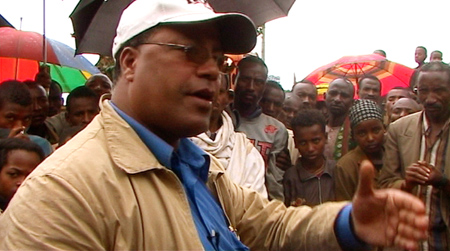

Reviews of Recent Independent, Foreign, & Documentary Films in Theaters and DVD/Home Video
Directors of Photography, Produced & Directed by: Marc & Nick Francis. Edited by: Hugh Williams. Music by: Andreas Kapsalis. Released by: California Newsreel. Language: with English subtitles. Country of Origin: UK. 78 min. Not Rated. Fifteen million Ethiopians are dependant on the coffee market, the second most-traded commodity after oil. But in areas where some of the most acclaimed beans in the world are grown, the population is malnourished, and schools are unable to even afford chalkboards. All of this despite the fact global sales total over $80 billion annually, and two billions cups of java are consumed daily. Tadesse Meskela, the mild-mannered manager of the Oromia Coffee Farmers Cooperative Union (which represents over 70,000 Ethiopian farmers), is David versus the Goliath of market-dominating corporations like Kraft, Nestlé, Procter & Gamble, and Sara Lee. He travels the world to find buyers for his top grade beans at a fairer market value, eliminating middlemen. His farmers need an increase of .57 cents to a kilo to change their lives (to buy clothes, have clean water, and send their children to school). One kilo, which is worth 80 cups, is traded for less than three dollars. The film raises issues that were mere sound bites during the 2005 G8 Summit. All that’s missing is Bono’s seal of approval. It sends a quiet alarm compared to the depressing Darwin’s Nightmare, which focused on the myriad of crises in Tanzania. Not only is there some justified – albeit cautious – hope for a change here, but directors Marc and Nick Francis’ singular examination of one African commodity conveys the dire economic picture for almost the entire continent; Africa’s share of international trade is roughly one percent. And unlike the horrific Darwin, Black Gold appeals more to the mind rather than emotion. (Although that is not to understate the impact of an infant girl being turned away from an emergency aid center for not being emaciated enough in one region where Starbucks gets its beans, contrary to what the uplifting in-store pamphlets might lead you to believe about the company’s global altruism.)
However, the reasons for the breakdown of international trade agreements are not explained, and is it really news that
Italians have to have their cup of espresso in the morning? What would have been more helpful is some sort of breakdown of who takes
how much for, say, a large cup at Starbucks. Also aiding the filmmakers’ case would have been an estimate of how much coffee
would be at a franchise or in a supermarket if the beans were purchased at fair market value. (Based on my own unscientific,
off-the-cuff observations here in New York City, the prices would be about the same, if not a little bit less.) Overall, the
film goes down more like decaf rather than a triple espresso as the directors emphatically but quietly build their case.
But unlike another consumer awareness-raising documentary, Who Killed the Electric Car?, viewers may feel more emboldened
to actually change their purchases – a cup of coffee is a daily habit easier to modify than a motor vehicle.
Kent Turner
|